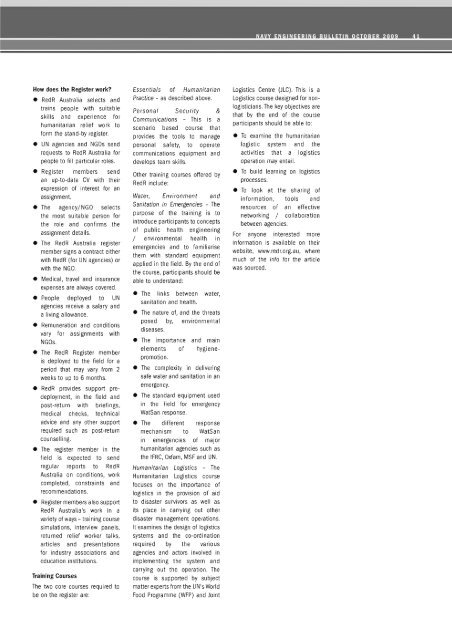ENGINE - Royal Australian Navy
ENGINE - Royal Australian Navy
ENGINE - Royal Australian Navy
You also want an ePaper? Increase the reach of your titles
YUMPU automatically turns print PDFs into web optimized ePapers that Google loves.
How does the Register work?<br />
• RedR Australia selects and<br />
trains people with suitable<br />
skil ls and experience for<br />
humanitarian re lief work to<br />
form the stand-by register.<br />
• UN agencies and NGOs send<br />
requests to RedR Australia for<br />
people to fi ll particular roles.<br />
• Regi ster members send<br />
an up-to-date CV with their<br />
expression of interest for an<br />
assignment.<br />
• The agency/NGO selects<br />
the most su itable person for<br />
the role and confirms the<br />
assignment details.<br />
• The RedR Australia register<br />
member signs a contract either<br />
with RedR (for UN agencies) or<br />
with the NGO.<br />
• Medical, travel and insurance<br />
expenses are always covered.<br />
• People deployed to UN<br />
agencies receive a sa lary and<br />
a living allowance.<br />
• Remuneration and conditions<br />
vary for assignments with<br />
NGOs.<br />
• Th e RedR Register member<br />
is deployed to the field for a<br />
period that may vary from 2<br />
weeks to up to 6 months.<br />
• RedR provides support predeployment,<br />
in the field and<br />
post-return with briefings,<br />
medical checks, technical<br />
advice and any other support<br />
required such as post-return<br />
counselling.<br />
• The register member in the<br />
field is expected to send<br />
regu lar reports to RedR<br />
Australia on conditions, work<br />
completed, constraints and<br />
recommendations.<br />
• Register members also support<br />
RedR Austral ia's work in a<br />
variety of ways - training course<br />
simulations, interview panel s,<br />
returned relief worker talks,<br />
articles and presentations<br />
for industry associations and<br />
education institutions.<br />
Training Courses<br />
The two core courses required to<br />
be on the register are:<br />
Essentials of Humanitarian<br />
Practice - as described above.<br />
Personal Security &<br />
Communications - This is a<br />
scenario based course that<br />
provides the tools to manage<br />
persona l safety, to operate<br />
communications equipment and<br />
develops team skil ls.<br />
Other training courses offered by<br />
RedR include:<br />
Water, Environment and<br />
Sanitation in Emergencies - The<br />
purpose of the training is to<br />
introduce participants to concepts<br />
of public health engineering<br />
/ environmental health in<br />
emergencies and to familiarise<br />
them with standard equipment<br />
appl ied in the field. By the end of<br />
the cou rse, participants should be<br />
able to understand:<br />
• The links between water,<br />
sanitation and health.<br />
• The nature of, and the threats<br />
posed by, environmental<br />
diseases.<br />
• The importance and main<br />
elements of hygienepromotion.<br />
• The complexity in delivering<br />
safe water and sanitation in an<br />
emergency.<br />
• The standard equipment used<br />
in the field for emergency<br />
WatSan response.<br />
• The different response<br />
mechanism to WatSan<br />
in emergencies of major<br />
humanitarian agencies such as<br />
the IFRC, Oxfam, MSF and UN.<br />
Humanitarian Logistics - The<br />
Hum anitarian Logistics course<br />
focuses on the importance of<br />
logistics in the provision of aid<br />
to disaster survivors as well as<br />
its place in carrying out other<br />
disaster management operations.<br />
It examines the design of logistics<br />
systems and the co-ordination<br />
required by the various<br />
agencies and actors involved in<br />
implementing the system and<br />
carrying out the operation. The<br />
course is supported by subject<br />
matter experts from the UN's World<br />
Food Programme (WFP) and Joint<br />
Logistics Centre (J LC). This is a<br />
Logistics course designed for nonlogisticians.<br />
The key objectives are<br />
that by the end of the course<br />
participants shou ld be able to:<br />
• To examine the humanitarian<br />
logistic system and the<br />
activities that a logistics<br />
operation may entail.<br />
• To build learning on logistics<br />
processes.<br />
• To look at the sharing of<br />
information, tool s and<br />
resources of an effective<br />
networking / collaboration<br />
between agencies.<br />
For anyone interested more<br />
information is avai lable on their<br />
website, www.redr.org.au . where<br />
much of the info for the article<br />
was sourced.

















